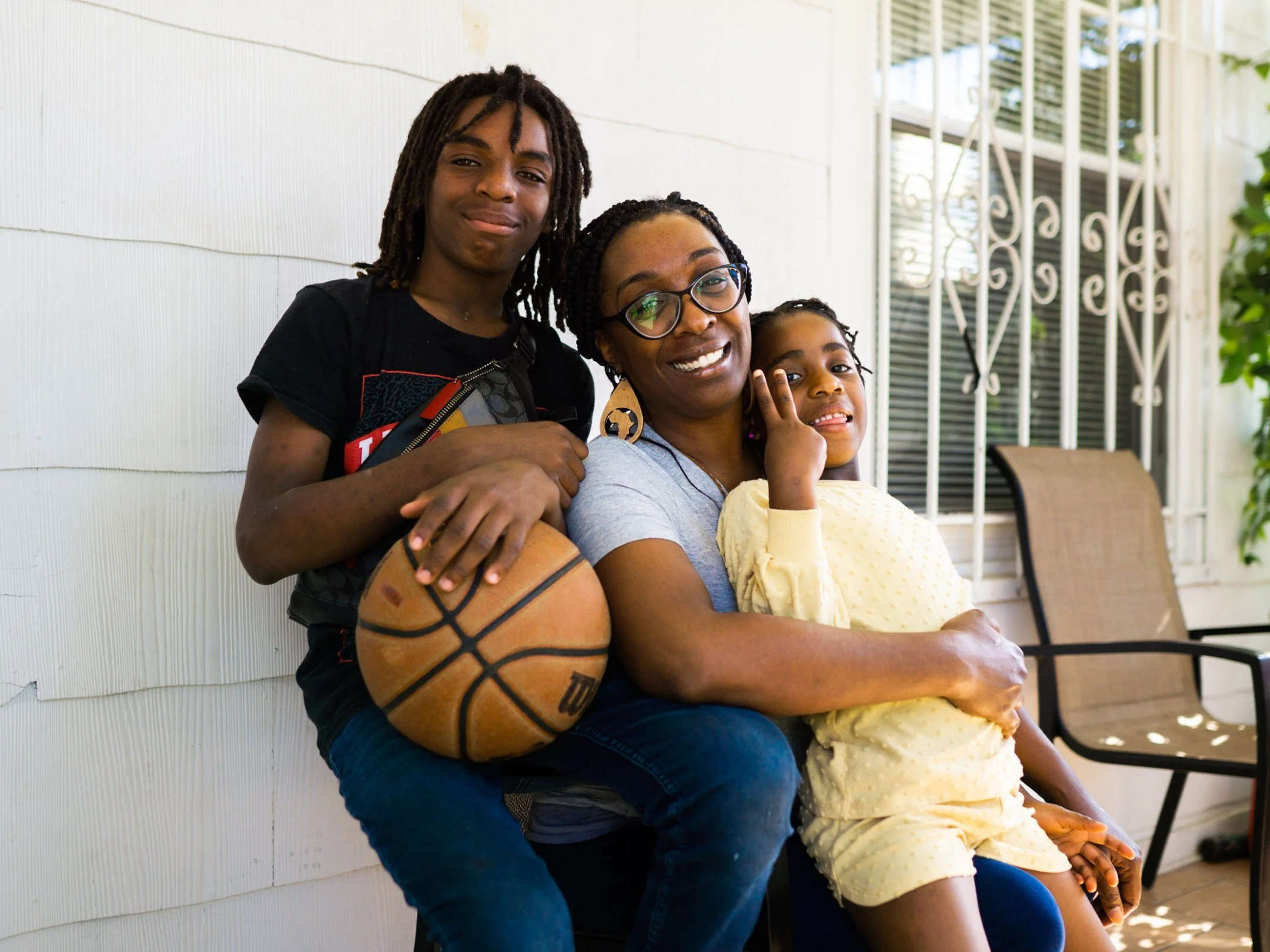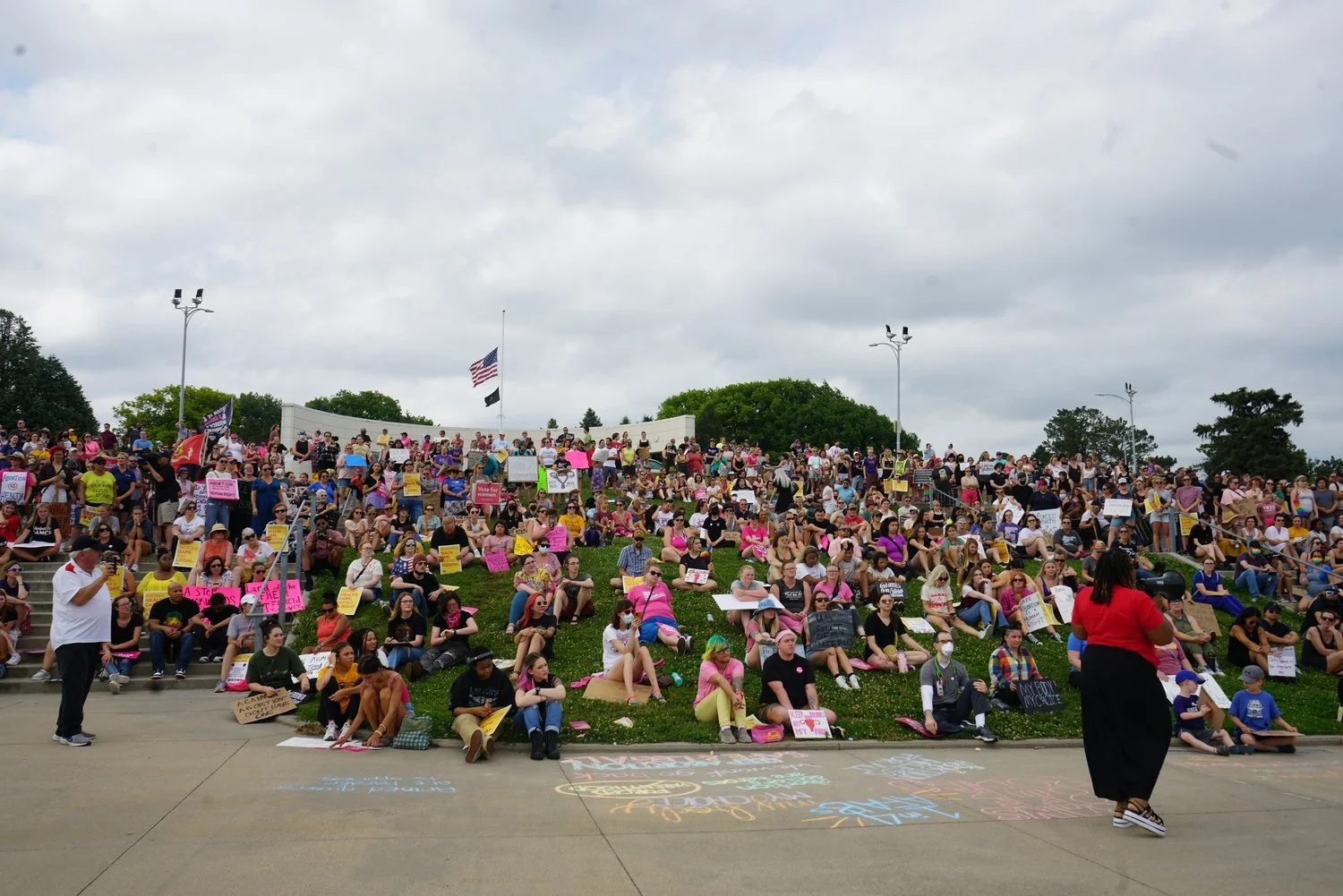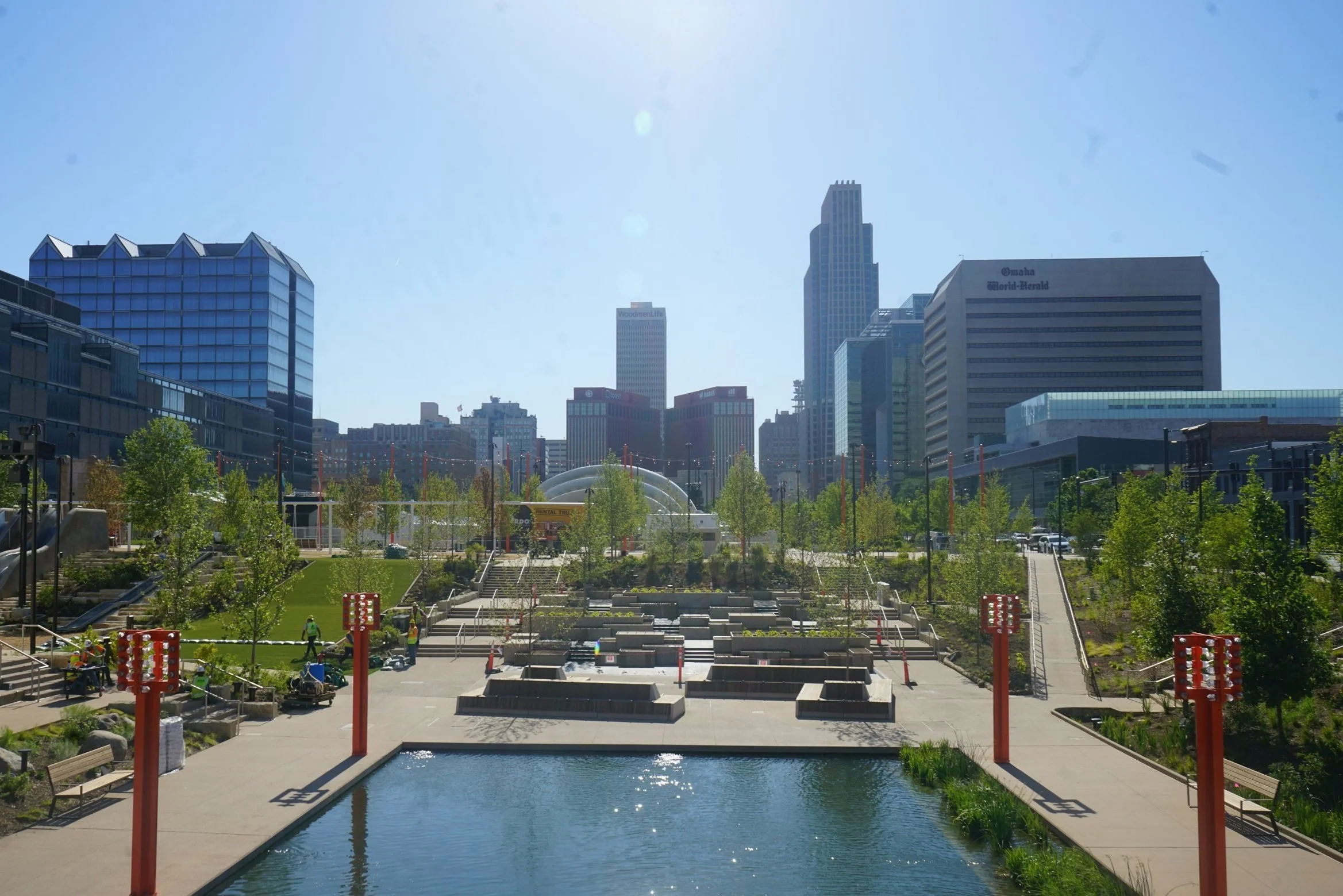Leaving Home Behind: Afghans in Nebraska Share Stories of the Kabul Airlift
Illustration by Lyndsay Dunn of NOISE
By Elle Love
Two Afghan refugees shared their stories of getting out of now Taliban-controlled Afghanistan at a forum hosted by the University of Nebraska Omaha (UNO) Center for Afghanistan Studies and the National Counterterrorism Innovation, Technology, and Education Center (NCITE) last week (Oct. 20). The panel, Afghanistan:What Comes Next?, discussed the humanitarian crisis in Afghanistan and analyzed the country’s existence from the first Taliban rule until now. Panel members included Coordinator of Education & Outreach Programs for UNO’s Center of Afghanistan Studies Hanif Sufizada and University of Nebraska-Lincoln (UNL) Fulbright Scholar Nasrin Nawa.
NCITE is a university program federally by the U.S. Department of Homeland Security Science & Technology (S & T) Centers of Excellence.
The panel, moderated by NCITE Strategic Communications Director Erin Grace, also included Director of UNO’s Center of Afghanistan Studies Sher Jan Ahmadzai, NCITE Ph. D. researchers Michelle Black and Austin Doctor, and Deputy Chief of Staff for Rep. Don Bacon Felix Ungerman.
Sufizada and Nawa shared their experiences on the ground during the Taliban takeover of Kabul. Nawa spoke specifically about being a woman in the country and growing up in Afghanistan during the past 20 years when the Taliban was not in control. “We had the opportunity to choose, to decide independence and to have our basic rights as human, as women, and now it is so different,” Nawa said.
“I have many friends in Afghanistan that they cannot go to school or a university and even if they are allowed to go by the system...their parents and family are so worried to let them go out under the Taliban regime.”
Several weeks after Kabul fell to the Taliban, on her Twitter account in mid September, Nawa wrote “I remember going to ‘school’ in Ghazni back in 2008. Our classroom was in unoccupied empty shops with nothing but a blackboard & a chalk and a chair for the teacher. Now, even that is taken away from the girls in Afghanistan.” She wrote also of women resisting new restrictions on their clothing.
Nawa, 27, was previously a journalist for BBC Persian based in Kabul. She wrote an account of her evacuation published in the Washington Post at a time when her younger sister, also a journalist, was hiding in relatives’ homes, unable to get money from the bank or reach the airport. Her sister is now safe in the United States after a long struggle to leave the country.
“I’m happy that she can finally make it out in a safe place in the United States, but sadly my parents are in Afghanistan in hiding and if nothing else, I would like to add that you give your prayers and your hearts that I can take them out to a safe place.”
Hanif Sufizada is an Afghan native with a U.S. passport who had to leave family behind in the midst of the Taliban takeover. But in 2003 when the Taliban was not in power, he joined the election commission his senior year of high school.
“I was the first among three guys to work for the election commission of Afghanistan because I was proud to voice our choice of choosing your leader,” Sufizada said. “We had a country, we had an identity […] but we very much ignored what was going to happen next because it was to my bad luck and everybody else’s bad luck that Afghanistan collapsed again on August 15.”
Hanif Sufizada’s story
Before coming to the U.S. more than four years ago, where Sufizada now works for UNO, he worked for the ministry of agriculture in Afghanistan, helping connect farmers to national and international markets. He was on a trip back to Afghanistan visiting family when the Taliban began to retake the country after 20 years out of power. On the day the Taliban took over Kabul, Sufizada waited a few days for a flight back to Omaha but was unable to get a plane ticket because the government in Afghanistan started to collapse and the traffic in Kabul was chaotic. “I started going to the U.S. Embassy. After waiting his turn to speak officials about being evacuated, he was told “No, we don’t have our embassy here in this building anymore. You have to go to the airport because the whole embassy shifted,” Sufizada explained.
Sufizada left the embassy and walked several miles back to his family home to pack his belongings and say goodbye to his family. Exhausted from the travel and the heat, he had second thoughts about leaving.
“It took me a while to reach there and then I was so tired, I didn’t even want to come to the airport.” He told himself, ‘Okay I’ll stay here tonight and then maybe tomorrow I go.’ He was so tired, he just wanted a shower to wash off the sweat and heat of the day. Speaking on the phone, Sufizada’s friend told him, ‘No, you don’t have time to take shower,’ reminding him he would be left behind if he didn’t leave for the airport. “Then I just took a cup of tea, and I asked my brother to take the car.”
As Sufizada’s brother drove him to the airport, he observed the chaos in the city amidst the endless traffic jam which he thought was caused by citizens fleeing out of fear of the Taliban and the release of prisoners from the Pul-e-Charki central prison.
“All the roads were filled with these prisoners, and it looks so scary…They look different from ordinary people. I was so scared.”, Sufizada said because he was carrying with him U.S. documents like his teaching VISA, Nebraska state I.D. and driver's license -- the only document he didn’t have was his U.S. passport.“If they see that I have American documentation, they will put me at risk, so I told my brother just to try to get out of these areas. So luckily after two and a half hours, we managed to reach the airport although it’s a 30-minute drive.”
Sufizada said the U.S. armed forces did not allow people in the airport for “mob control” due to the increased number of people attempting to get inside. When he showed security his documentation, he was allowed in but lacked enough time to say goodbye to his brother. “I didn’t even hug them that day. I said, ‘[This] may be my last farewell to you in person because I may not see you again.’ So I just left and entered the airport. Then I saw that there was no one there,” Sufizada said.
Sufizada went to where other Afghan civilians were gathering and was told that only those with special immigrant visas were allowed to board the planes. He said there were other people with legitimate plane tickets, but they were told “to leave the airport because their seats were given for the high ranking officials,” Sufizada said. He tried to find American forces and civilians as he asked where he could board an available plane back to the United States. “It took me like four hours to find them,” he said.
Sufizada was finally given the correct gate number, but was unable to board the plane because he did not have his U.S. passport, nor a ticket. An employee of the airport told him to wait in the area where international people were being picked up from the gate. After a few hours, he and a handful of other people were picked up by a bus around 10 at night.
“We were waiting for a bus to take us to hangar where we will be manifested for our flight but while we were waiting, all of the sudden, the mob of people and children [...] just attacked the American forces and they said, ‘Take us with you. We cannot stay here in Kabul. Take us with you.’ And then those civilians — American civilians — were confused about what to do.”
He recalled hearing gunfire outside of the door as troops tried to scare off the mob gathering around the planes. He was told that only American passport holders were allowed to leave. His U.S. passport was the only documentation he didn’t have with him.
“There was firing and we got scared so we came back. I made it for like four to five hours to the point, but then I had to come back because we were scared and they [the crowd] were pushing us, hitting and fighting us. [I] saw that one child was trampled down and there was another old woman, they were under feet and they could not go, they had their luggage.”
Sufizada said he witnessed the crowd grow bigger and uncontrollable that night to almost 1,000 people surrounding the terminal. U.S. troops set up barbed wires to keep them from being able to board the planes. He eventually left the tarmac and went back inside the airport, where it felt safer to spend the night. Unable to sleep, he continued his efforts of convincing U.S. troops that he was an American citizen and to allow him to evacuate. He called his UNO supervisor and a former supervisor from Tetra Tech to ask them to speak to the U.S. armed forces. He then had to make the daunting choice between staying inside the airport or going home and coming back over dangerous roads to the airport the next day.
“The city was very empty at that point, so then I said, ‘Okay I will have to stay.’But there were no food, there was no bathroom, and then, of course, we were so tired and we could not sleep, no water. But I said, ‘Okay, we will endure it for the sake of safety. It’s better than to die outside,” Sufizada recalled.
He stayed in the airport the next day, Aug. 16, and witnessed inadequate security making it possible for more people to enter the airport. He said it, “turned into a jungle”.
Sufizada recalls hearing young boys call out to the planes, knowing the transport was only for those working for the U.S. and those in immediate danger, like female journalists.
“People started playing with the airplane. They ransacked the whole airport, the computers, the counter…all the vending machines. So, you could not see anything…” Sufizada said.
He heard little voices coming from “street boys” saying they wanted to go to America, but he thought, “It was not for them […]”
He heard another round of gunshots fired to control the mob. The chaos on the airport tarmac made him too afraid to go outside.
“Three guys fell out of the plane, so I saw them with my own eyes. It got so chaotic and now, at the time, I was not willing to go because I was more scared […] I may be hit with bullets,” he said.
Sufizada said it was hard to keep track of U.S. Marine officers because they changed shifts on days and nights. “It was difficult for us to know who the first guy was because they all looked the same with their military helmets. Their facial expression was the same and we were so tired. We couldn’t recognize them very well. My friend said, ‘Okay, let’s take the names. Why don’t you write your names? So next time somebody asks us who told us to stay here, then we’ll say, ‘So-and-so told us.’”
It wasn’t until Sufizada told one of the armed officers he worked for the University of Nebraska at Omaha and showed his documentation, that they stopped asking him to leave the airport. He had with him his U.S. work visa, his drivers license, and Nebraska state I.D., but he did not have his American passport. Those three documents were enough however, and he was then allowed to go to the next gate where another officer checked his documentation. He was finally allowed to enter the hangar.
“In the hangar, I was so tired that I slept. I took a nap and told the officer that I’m taking a nap and when you are boarding, please let me know. I took a nap and then when I woke up, I saw that there was no one in the hangar, everyone was gone.” Sufizada thought he might have been left behind before he witnessed people boarding the plane to Qatar and ran up to the boarding area in time to get inside.
with that, Sufizada left Kabul.
“We were so cramped.”
“From there they took us to Qatar, and from Qatar, we had to stay another two to three days. I knew food was there, water was there, but there was no sleep. There was no place to sleep from there,” said Sufizada
“I was so scared, and I could not talk to people. My life is very low, and I had a lot of nightmares, full of nightmares. My family’s still in Afghanistan and they’re asking me to rescue them.”
Sufizada flew from Kabul to Qatar, to Washington D.C., to Dallas, Texas before arriving in Omaha. Since he arrived home, he has felt psychological trauma from the experience.
Sufizada said the U.S. response to the crisis including evacuation should have been handled better and that the Taliban and the U.S. backed government in Afghanistan should have negotiated a peaceful transition of power under the agreement of national amnesty.
“Our President [Ashraf Ghani] left the country without informing the nation. He just left and when Taliban came in power, people were so scared because they had a bad experience of the first era from 1996 to 2001,” Sufizada said. “People are so scared that they may lynch people on the roads and that's why they rush towards the airport, which was the only safe place.”
Sufizada said the best way for U.S. citizens to help Afghans is to support organizations who are currently aiding the influx of refugees migrating to the Omaha area and to voice your concerns to your elected representatives. “Our representatives here in Nebraska can be of great help,” he said.
The Center for Afghanistan Studies recently established a consortium for Afghan refugees in Omaha. Over 20 organizations are involved in the consortium including Lutheran Family Services, OPPD, Global Connections, Miller Public Schools, Creighton University, Refugee Empowerment Center, Habitat for Humanity, Equus Workforce Solutions, American Muslim Institute, Church of Jesus Christ of Latter-Day Saints and more.

















